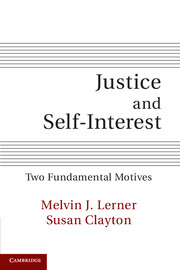Book contents
- Frontmatter
- Contents
- List of Figures and Tables
- Preface
- 1 Contesting the Primacy of Self-Interest
- 2 Why Does Justice Matter? The Development of a Personal Contract
- 3 Commitment to Justice: The Initial Primary Automatic Reaction
- 4 Explaining the Myth of Self-Interest
- 5 Defining the Justice Motive: Reintegrating Procedural and Distributive Justice
- 6 How People Assess Deservingness and Justice: The Role of Social Norms
- 7 Integrating Justice and Self-Interest: A Tentative Model
- 8 Maintaining the Commitment to Justice in a Complex World
- 9 Bringing It Closer to Home: Justice in Another “American Tragedy”
- 10 Emotional Aftereffects: Some Negative Consequences and Thoughts on How to Avoid Them
- References
- Author Index
- Subject Index
7 - Integrating Justice and Self-Interest: A Tentative Model
Published online by Cambridge University Press: 03 May 2011
- Frontmatter
- Contents
- List of Figures and Tables
- Preface
- 1 Contesting the Primacy of Self-Interest
- 2 Why Does Justice Matter? The Development of a Personal Contract
- 3 Commitment to Justice: The Initial Primary Automatic Reaction
- 4 Explaining the Myth of Self-Interest
- 5 Defining the Justice Motive: Reintegrating Procedural and Distributive Justice
- 6 How People Assess Deservingness and Justice: The Role of Social Norms
- 7 Integrating Justice and Self-Interest: A Tentative Model
- 8 Maintaining the Commitment to Justice in a Complex World
- 9 Bringing It Closer to Home: Justice in Another “American Tragedy”
- 10 Emotional Aftereffects: Some Negative Consequences and Thoughts on How to Avoid Them
- References
- Author Index
- Subject Index
Summary
Up to this point the focus has been on three tasks. The first involved explaining how justice imperatives become a pervasive and important source of human motivation. Our second task was to critically reexamine the evidence for how self-interest appears in people's lives. That reanalysis of available evidence persuasively described how preconscious self-conceited beliefs, rather than self-serving motives, biased judgments of deservingness; that does not negate the common observation that people may, at times, intentionally manipulate rules of fairness or ignore them to justify benefiting themselves. Finally we described, with supporting evidence, how people arrive at judgments of deservingness and justice.
The important task now is to understand when and how self-conceited beliefs, and motivations based on self-interest, might interact with the important influence of justice imperatives in order to guide emotional and behavioral responses. We will begin by examining a few experiments that provide examples in which justice imperatives appear along with motivations based on self-conceit and self-interest as alternative and/or conjunctive influences in people's lives.
Persistent Influence of Initial Automatic Imperatives
One set of studies illustrates the way the preconscious effects of the justice motive can override self-interest. Apparently, when people are highly aroused by the initial recognition of an injustice to themselves or others, they will often ignore or at least be relatively unaffected by the dictates of conventional rules of rational judgment (Simons and Piliavin, 1972). In addition, they may ignore considerations of self-interest, as they automatically engage in emotion-directed justice-restoring reactions.
- Type
- Chapter
- Information
- Justice and Self-InterestTwo Fundamental Motives, pp. 145 - 190Publisher: Cambridge University PressPrint publication year: 2011



